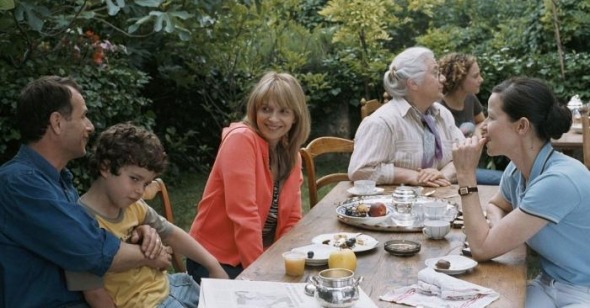Of Time and the Country
by Chris Wisniewski
Summer Hours
Dir. Olivier Assayas, France, IFC Films
Early in Olivier Assayas’s elegant and elegiac Summer Hours, grown siblings sit at a table with their aging mother outside their family’s country home. Paging through a book of their late great-uncle’s art, they notice a picture from generations ago of people sitting at the very same table, in the very same place. The people are dead, but the table, the object, endures. Later, one of these siblings, Frederic (Charles Berling), opens the drawer of an armoire that belongs to his mother but is basically a museum piece, and pulls out a toy plane that someone, perhaps he as a child, left there. The furniture is a work of art, but it’s also a part of a living space, a repository of memories. “You prefer objects not weighed down by the past,” the mother (a marvelous Edith Scob) tells her daughter, Adrienne (Juliette Binoche). In Summer Hours, though, every object, and every place, is weighed down by the past—indeed, the past gives these things their value, sentimental and otherwise.
In his last three feature films, Assayas has flung his characters from Paris to Hong Kong, Vancouver to San Francisco, and Tokyo to Paris back again. His is a particularly kinetic cinema that is very much of this moment, built on roving hand-held camerawork and exquisitely choreographed tracking shots, preoccupied with globalization. By contrast, Summer Hours opens placidly with a static shot of the country house. The image, which almost seems to stand outside of time, suggests a melancholic nostalgia and an uncharacteristically rooted sense of place. When Frederic, Adrienne, and their younger brother, Jeremie (Jeremie Renier), inherit the home and the paintings, sculptures, and furniture within it (a collection of such artistic significance that the Musee d’Orsay expresses interest), they must decide what to do with the estate - a challenge, since Adrienne lives in the U.S. and Jeremie has relocated to Beijing. Like many of Assayas’s characters, these two are citizens of a flattening world where national borders feel increasingly irrelevant, but their dilemma is (like the film itself) parochial, tied to a place and a past they left behind.
Frederic, the one sibling who’s stayed close to home, wants desperately to keep the house and expects his siblings to share his sentiment, but their discussions on the matter take an unexpected turn. An economist by trade, Frederic studies uncertainty and the volatility it produces in markets (at one point, he describes his trade as “the opposite of science”), but he fails to make an allowance for uncertainty in his personal affairs: he willfully refuses to anticipate his siblings’ impulse to cash in on their legacy. The family resolves this conflict democratically in a brilliantly directed sequence in which Frederic, Jeremie, their wives, and Adrienne navigate their way around a narrow kitchen, shot by Assayas and his cinematographer Eric Gautier with claustrophobic dexterity. Here, the film’s central drama plays out as a non-conflict, a struggle of great emotional significance waged in hushed voices and quiet asides by adversaries who are eager to empathize and bound together by mutual affection and shared history.
Summer Hours lingers less on these negotiations than on the humdrum of arranging donations, appraising art, and navigating the nuances of the estate tax. If this all sounds rather tedious (a friend described it as the cinematic equivalent of a New Yorker article), Assayas captures the philosophical and emotional subtext of each of these mundanities with a delicate and droll touch, as the silences and spaces between the characters continually threaten to pierce the film’s austere surface and reveal the depth of the family drama underneath. Frederic tearfully mourns his family’s legacy when he sneaks away from Jeremie and Adrienne. In conversation with Frederic, Jeremie barely masks the resentment he feels towards his mother and great-uncle (a relationship he understands, in his cynicism, more clearly than his brother). Their sister, meanwhile, simply refuses to engage with them emotionally, retreating to her busy American life. Assayas’s skill with actors has always matched his technical virtuosity, and in this film, Berling, Renier, and Binoche give precise, restrained performances that are quietly riveting.
Summer Hours may strike some viewers as a departure from demonlover, Clean, and the underappreciated Boarding Gate, but it’s clearly the work of the same steady hand, keen eye, and inquisitive mind—a filmmaker who captures the movements of people through spaces with unassuming mastery and who sees in everyday gestures and ordinary exchanges the ties that bind and the forces that atomize. The film even marks something of a return for Assayas: in its final act, Paul’s daughter Sylvie (Alice de Lencquesaing) moves to its narrative center in a subplot that parallels the story of his 1994 breakthrough Cold Water. But Summer Hours never simply retreads, instead replacing the earlier film’s angst-ridden intensity with a gentle, knowing sadness. Unlike Cold Water’s protagonist Christine, Sylvie will probably be alright, but she—like her father—needs to grapple with the loss she’s experiencing. It would be criminal to spoil the film’s final moments in this review, but this beautiful, altogether magnificent movie ends on a note of perfect grace, as Sylvie silently reflects on what is gone and realizes that her life, like the place she’s leaving behind, is now, too, weighed down by the past.
